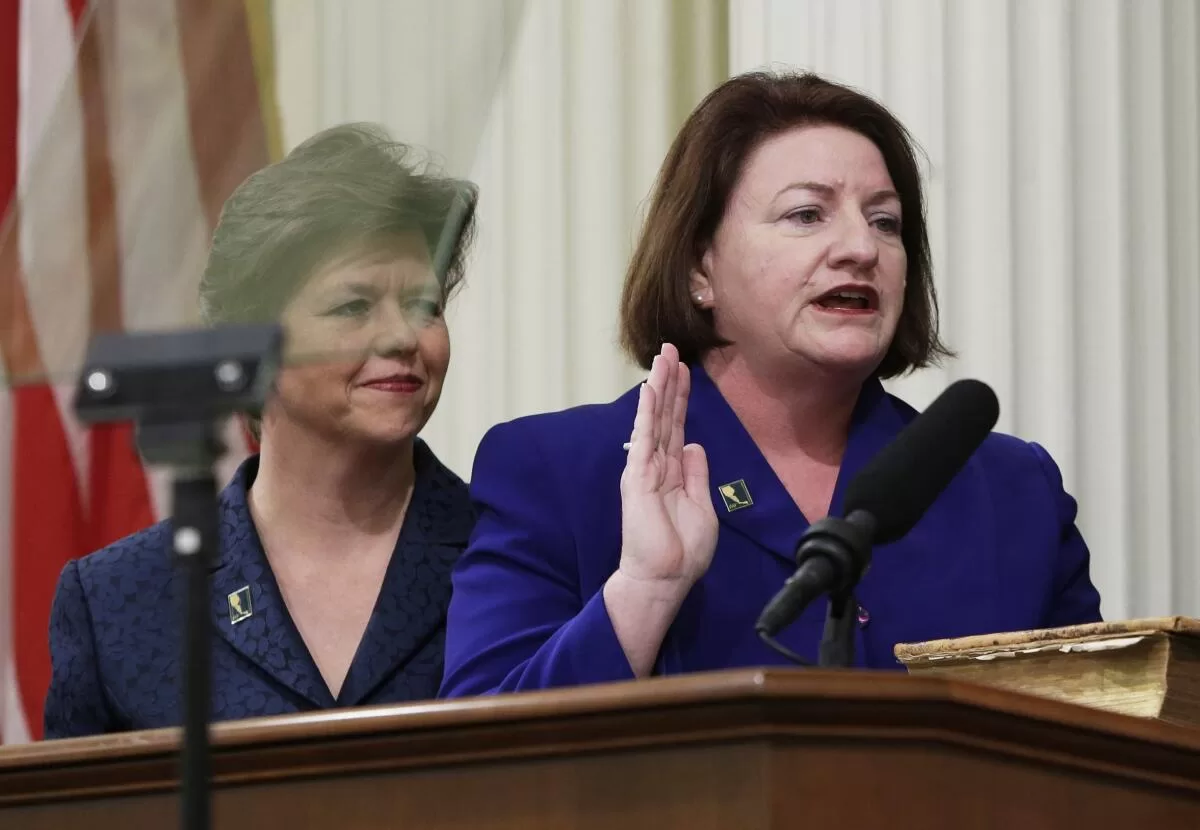Not that they should necessarily. But she’s worth serious consideration. Voters will have two years to size her up and decide before Newsom is termed out at the end of 2026.
That is, if she can raise the many millions of dollars needed to hang on for that long in a highly competitive race. She’s starting out with about $2.3 million, barely enough to ante up in this high-stakes contest.
That’s the reason Atkins, 61, and other gubernatorial wannabes are announcing their candidacies this early. They need to raise enough money to attract attention and get their messages out to 27 million potential voters in this far-flung, highly diverse state.
Atkins has an added problem unlike some other candidates: She has never run in a statewide race before and is largely unknown north of San Diego.
She formally entered the contest Friday at a campaign rally in her hometown.
The legislative leader told me she leaped into the race because she concluded she could handle the job as well as anyone else, if not better.
Atkins definitely is not the type of person Californians have become used to electing as their governor.
For starters, she’s a woman. All California governors elected since statehood have been white men.
But the odds have improved that this historical gender preference will change in 2026. Two other candidates are women: Lt. Gov. Eleni Kounalakis and former state Controller Betty Yee.
This will be a wide-open competitive race and probably without a clear front-runner for a long while. There isn’t a real attention grabber out there — anyone who would fit the political world’s definition of “heavyweight.”
State Supt. of Public Instruction Tony Thurmond is running. He’d be California’s first Black governor.
State Atty. Gen. Rob Bonta is still weighing whether to jump into the gubernatorial contest or run for reelection.
Atkins is also different in another way: She’s not real telegenic — not Hollywood handsome like Newsom. And looks, unfortunately, can affect voters’ decisions. Nor is she a rock star as former Gov. Jerry Brown was into his 70s. She’s hardly a global celebrity like former Gov. Arnold Schwarzenegger.
But Atkins can be a compelling orator who speaks with controlled passion. She has the invaluable political asset of authenticity.
(Associated Press)
Atkins would be California’s first openly LGBTQ+ governor — just as she was the first lesbian Assembly speaker and Senate president pro tem. In fact, she was the first female Senate leader — and the first lawmaker in 146 years to lead both legislative houses. That tells a lot about the respect she has among people who chose her as their leader.
She’s extraordinarily qualified to be governor based on her experience of getting up to speed on virtually every problem California has faced during a 14-year legislative career. Before that, she was a San Diego City Council member learning about local problems.
“I’m ready to hit the ground running,” Atkins told me. “I’m not going to miss a beat. You’re not going to have to explain CEQA [the California Environmental Quality Act] to me or California’s transportation system.”
OK, what about those two issues?
On environmental regulations, California still needs to keep “cutting through bureaucratic red tape” and “relaxing zoning” to lower the cost of home construction, she says.
As for the homeless, “we need to take a deeper dive into what’s working and not working.”
The bullet train: “Get on with it and get it done — make sure it gets completed in somebody’s lifetime.”
Also, here’s an issue you don’t hear much about from Democrats: crime. “We have to take a hard look at how to make our neighborhoods safe — and to shop without fear of our safety, unlike what people are facing today.”
How? “Focus on the real culprits who are committing most of the crimes,” she replies. “We don’t want to start filling up the prisons again with the wrong people. But those who should be there should be jailed.”
Yes, we’ll need a lot more details.
Her proudest achievement as a legislator? Passing a $7.5-billion water bond in 2014 that voters approved.
“That enabled us to provide clean drinking water,” she says. “That was especially important for this person who grew up carrying water from the spring.”
That’s another thing different about Atkins: She was raised in what most of us would call poverty — in rural southern Virginia in a small rented house with no running water and a privy outside. Her dad was a coal miner and her mom a seamstress, always struggling to make ends meet.
“I didn’t do well in school until a donated pair of glasses from the local Lions Club helped me see the board and do the lessons,” she recalled in her candidacy announcement. “When I was growing up, being able to live in a double-wide trailer was the dream.”
“I don’t fit in the mold of most other candidates,” she said in an interview. “My story is much more like those of many other Californians.”
The hardscrabble upbringing has inspired Atkins’ legislative agenda — including providing earned income tax credits for poor people and supplying permanent state funding to help low-income families buy affordable housing. She also has been a crusader for abortion rights.
She’s ready to be governor. But her toughest job will be running the race to win the office.
